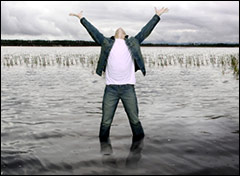Dear Umbra,
I’m a bit confused about the possible rise in sea level that may be caused by global warming. I know that in general water expands when warmed, and that is one cause of sea level elevation with respect to global warming. The larger cause for alarm seems to be the melting or collapse of the polar ice caps. I recently read an article that warned that Antarctica, which stores 70 percent of the world’s fresh water, could lose the Ross Ice Shelf (a block of ice the size of France) suddenly and without warning and “that its collapse would make sea levels rise by at least 5 meters, with other estimates predicting a rise of up to 17 meters.” My question is how quickly would such a rise register?
Saor
Mill Valley, Calif.
Dearest Saor,
I got all swept up and joined your completely logical confusion. If ice shelves collapse, when can we expect the swamping wave? Happily, this is incorrect thinking. Many thanks to the good people at Environmental Defense for straightening out my confusion. My mind now runs clear as a glacial river to the sea of climate comprehension.

Should have worn my high-waters …
Sea level rise is and will be due to two factors, which Saor mentions. We are warming the atmosphere by increasing greenhouse gas concentrations, the oceans are absorbing large parts of this warmth, warmer water takes up more space, hence the global sea level is rising. The other factor in sea level rise is the collapse of ice shelves and tongues, and the melting of land-based ice caps. These icy items are related but not the same, and here is where the potential confusion lies.
Ice shelves and tongues are part of a giant ice sheet, or cap, covering a land mass (e.g., Greenland and Antarctica). They stick out from the ice sheet into the ocean, like … like tongues! Or shelves! Atop the ice sheet are various glaciers that flow toward the sea. The glaciers add their icy mass to the shelf, but the importance of the shelf is that it presses back against these glacial flows and stops them from entering the sea.
For you see, the shelf is already in the sea, and the glacial ice is not. Returning to Soar’s Ross Ice Shelf example: “Collapse” in this case means detach, disintegrate, perhaps vanish. Collapse conjures an image of a sudden splashy fall into the water. But ice shelves are already in the water, so their detachment and disintegration does not add any mass to the global sea volume in and of itself. Sea rise ensues, however, because no shelf is now there to bar the glacial flow and other melting ice sheet bits from entering the oceans.
The collapse of an ice shelf, then, does result in sea rise — but in a delayed kind of way. The 5 to 17 meters mentioned in the article actually refers to the rise that could be caused by the ensuing melt of the West Antarctic Ice Sheet, which scientists don’t expect to happen in our lifetimes.
In fact, scientists are still actively modeling exactly how much ice is likely to melt into the oceans, how far the global sea level will rise, and how fast all this will happen. Pretty much the only good news is that we don’t expect sudden swamping waves following ice shelf collapse. To answer your basic question, usually estimates of dramatic sea rise are “by 2100” or the next few centuries kind of range. The IPCC sea level rise estimate, of 0.22 to 0.44 meters above 1990 levels by 2090, is quite conservative, and there’s been a lot of talk that it is low; one recent paper estimated a rise by 2100 more like 1.4 meters.
Many millions of folks live close enough to current sea level that any significant rise will be a calamity, and it looks certain that this is already happening. Sea levels have risen, on global average, 3.1 millimeters a year since 1993. So no swamping waves — but as the helpful Tony Kreindler at Environmental Defense said to me, “That shouldn’t diminish the general disasterishness of it all.”
Glacially,
Umbra

